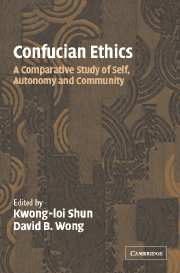Book contents
- Frontmatter
- Contents
- Contributors
- Contributors
- Introduction
- SECTION I RIGHTS AND COMMUNITY
- SECTION II SELF AND SELF-CULTIVATION
- 5 Tradition and Community in the Formation of Character and Self
- 6 A Theory of Confucian Selfhood: Self-Cultivation and Free Will in Confucian Philosophy
- 7 The Virtue of Righteousness in Mencius
- 8 Conception of the Person in Early Confucian Thought
- SECTION III COMMENTS
- Glossary of Chinese Terms
- Index
8 - Conception of the Person in Early Confucian Thought
Published online by Cambridge University Press: 08 December 2009
- Frontmatter
- Contents
- Contributors
- Contributors
- Introduction
- SECTION I RIGHTS AND COMMUNITY
- SECTION II SELF AND SELF-CULTIVATION
- 5 Tradition and Community in the Formation of Character and Self
- 6 A Theory of Confucian Selfhood: Self-Cultivation and Free Will in Confucian Philosophy
- 7 The Virtue of Righteousness in Mencius
- 8 Conception of the Person in Early Confucian Thought
- SECTION III COMMENTS
- Glossary of Chinese Terms
- Index
Summary
INTRODUCTION
In recent discussions of comparative ethics, various claims have been made about the inapplicability of certain Western notions to the Confucian conception of the person. For example, some have observed that Confucians do not have a notion of self and do not draw a distinction between mind and body. Others, while working with the notion of self, have argued that the Confucian conception of self is constituted primarily by the social roles one occupies and that the notions of autonomy and rights are inapplicable to Confucian thought. The inapplicability of these notions is seen as reflecting distinctive features of Confucian thought, features that have an important bearing on our understanding of the ethical values of Asian societies influenced by the Confucian tradition and the potential inapplicability of certain Western political ideas to such societies.
While these claims about the inapplicability of certain Western notions are suggestive, the exact content and significance of such claims remain to be explored. On the one hand, if we build substantive Western philosophical presuppositions into the notions under consideration, claims about their inapplicability become uncontroversial and of dubitable significance. For example, the claim that Confucian thinkers do not subscribe to a Cartesian distinction between mind and body or a Kantian notion of autonomy is not one that many would dispute. On the other hand, if we construe the notions under consideration in a very general manner, claims about their inapplicability appear clearly false.
- Type
- Chapter
- Information
- Confucian EthicsA Comparative Study of Self, Autonomy, and Community, pp. 183 - 200Publisher: Cambridge University PressPrint publication year: 2004
- 24
- Cited by



